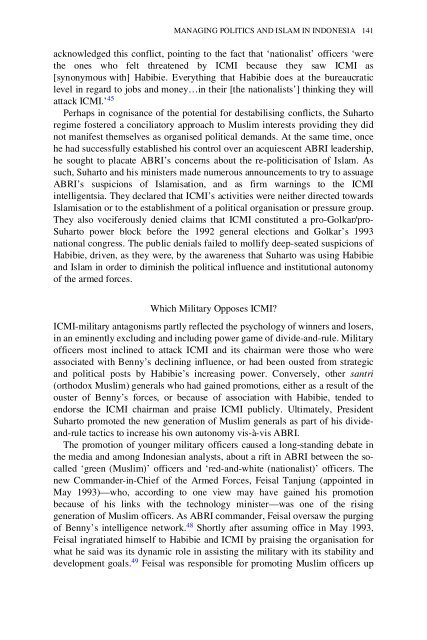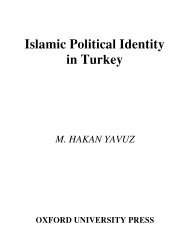You also want an ePaper? Increase the reach of your titles
YUMPU automatically turns print PDFs into web optimized ePapers that Google loves.
MANAGING POLITICS AND ISLAM IN INDONESIA 141acknowledged this conflict, po<strong>in</strong>t<strong>in</strong>g to the fact that ‘nationalist’ officers ‘werethe ones who felt threatened by ICMI because they saw ICMI as[synonymous with] Habibie. Everyth<strong>in</strong>g that Habibie does at the bureaucraticlevel <strong>in</strong> regard to jobs <strong>and</strong> money…<strong>in</strong> their [the nationalists’] th<strong>in</strong>k<strong>in</strong>g they willattack ICMI.’ 45Perhaps <strong>in</strong> cognisance of the potential for destabilis<strong>in</strong>g conflicts, the Suhartoregime fostered a conciliatory approach to Muslim <strong>in</strong>terests provid<strong>in</strong>g they didnot manifest themselves as organised political dem<strong>and</strong>s. At the same time, oncehe had successfully established his control over an acquiescent ABRI leadership,he sought to placate ABRI’s concerns about the re-politicisation of <strong>Islam</strong>. Assuch, Suharto <strong>and</strong> his m<strong>in</strong>isters made numerous announcements to try to assuageABRI’s suspicions of <strong>Islam</strong>isation, <strong>and</strong> as firm warn<strong>in</strong>gs to the ICMI<strong>in</strong>telligentsia. They declared that ICMI’s activities were neither directed towards<strong>Islam</strong>isation or to the establishment of a political organisation or pressure group.They also vociferously denied claims that ICMI constituted a pro-Golkar/pro-Suharto power block before the 1992 general elections <strong>and</strong> Golkar’s 1993national congress. The public denials failed to mollify deep-seated suspicions ofHabibie, driven, as they were, by the awareness that Suharto was us<strong>in</strong>g Habibie<strong>and</strong> <strong>Islam</strong> <strong>in</strong> order to dim<strong>in</strong>ish the political <strong>in</strong>fluence <strong>and</strong> <strong>in</strong>stitutional autonomyof the armed forces.Which Military Opposes ICMI?ICMI-military antagonisms partly reflected the psychology of w<strong>in</strong>ners <strong>and</strong> losers,<strong>in</strong> an em<strong>in</strong>ently exclud<strong>in</strong>g <strong>and</strong> <strong>in</strong>clud<strong>in</strong>g power game of divide-<strong>and</strong>-rule. Militaryofficers most <strong>in</strong>cl<strong>in</strong>ed to attack ICMI <strong>and</strong> its chairman were those who wereassociated with Benny’s decl<strong>in</strong><strong>in</strong>g <strong>in</strong>fluence, or had been ousted from strategic<strong>and</strong> political posts by Habibie’s <strong>in</strong>creas<strong>in</strong>g power. Conversely, other santri(orthodox Muslim) generals who had ga<strong>in</strong>ed promotions, either as a result of theouster of Benny’s forces, or because of association with Habibie, tended toendorse the ICMI chairman <strong>and</strong> praise ICMI publicly. Ultimately, PresidentSuharto promoted the new generation of Muslim generals as part of his divide<strong>and</strong>-ruletactics to <strong>in</strong>crease his own autonomy vis-à-vis ABRI.The promotion of younger military officers caused a long-st<strong>and</strong><strong>in</strong>g debate <strong>in</strong>the media <strong>and</strong> among <strong>Indonesia</strong>n analysts, about a rift <strong>in</strong> ABRI between the socalled‘green (Muslim)’ officers <strong>and</strong> ‘red-<strong>and</strong>-white (nationalist)’ officers. Thenew Comm<strong>and</strong>er-<strong>in</strong>-Chief of the Armed Forces, Feisal Tanjung (appo<strong>in</strong>ted <strong>in</strong>May 1993)—who, accord<strong>in</strong>g to one view may have ga<strong>in</strong>ed his promotionbecause of his l<strong>in</strong>ks with the technology m<strong>in</strong>ister—was one of the ris<strong>in</strong>ggeneration of Muslim officers. As ABRI comm<strong>and</strong>er, Feisal oversaw the purg<strong>in</strong>gof Benny’s <strong>in</strong>telligence network. 48 Shortly after assum<strong>in</strong>g office <strong>in</strong> May 1993,Feisal <strong>in</strong>gratiated himself to Habibie <strong>and</strong> ICMI by prais<strong>in</strong>g the organisation forwhat he said was its dynamic role <strong>in</strong> assist<strong>in</strong>g the military with its stability <strong>and</strong>development goals. 49 Feisal was responsible for promot<strong>in</strong>g Muslim officers up




